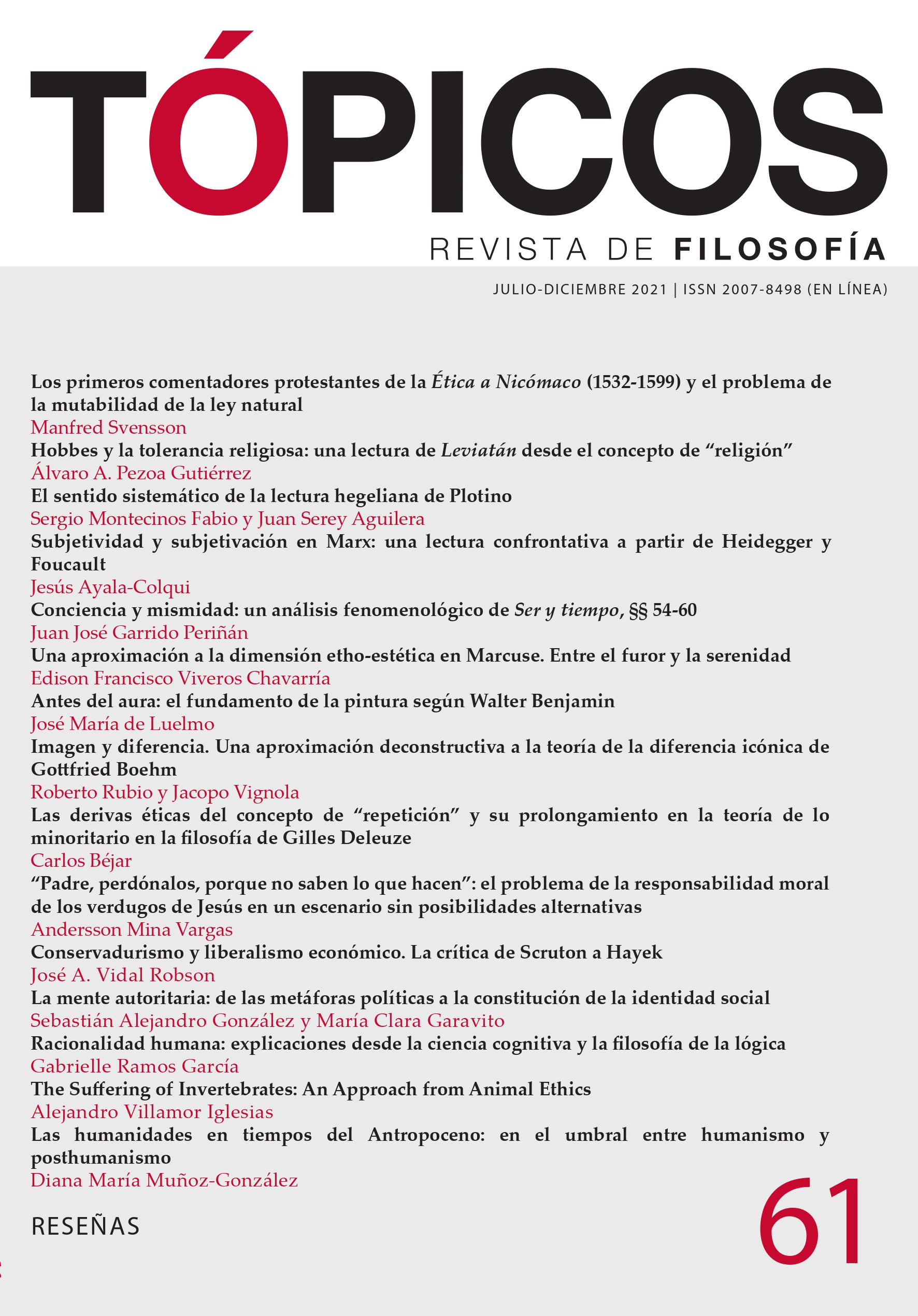Publicado 2021-06-23
Palabras clave
- Inteligencia (humana),
- racionalidad,
- disrracionalidad,
- razonamiento lógico
Derechos de autor 2021 Tópicos, Revista de Filosofía

Esta obra está bajo una licencia internacional Creative Commons Atribución-NoComercial-SinDerivadas 4.0.
Cómo citar
Resumen
En lo que sigue buscaré responder a la pregunta sobre la posibilidad de la integración de dos programas de investigación distintos sobre la racionalidad humana: por un lado, algunos programas filosóficos de corte cognitivista (Stanovich, 2002, 2009, 2016) y por el otro, programas de investigación sobre el razonamiento lógico de agentes humanos y criterios de normatividad (Harman, 1984; Morado, 2003; Aliseda, 2004). Mi respuesta a tal cuestionamiento será afirmativa. Para defenderla, procederé de la siguiente manera: primero, en la sec. 2 ofreceré los antecedentes y características de la noción cognitivista de “inteligencia” que cuenta con mayor aceptación en la actualidad, la teoría general de la inteligencia, también conocida como factor g. A lo largo de la sec. 3 expondré los elementos por los cuales se ha considerado que si bien factor g logra evaluar satisfactoriamente el fenómeno de la inteligencia, soslaya características relevantes desde la perspectiva de lo que se ha considerado racionalidad (Sternberg, 1985; Stanovich, 2009). Luego, en la sec. 4, presentaré algunas nociones de “racionalidad” disponibles en la literatura de filosofía de la lógica (Harman, 1984; Morado, 2003; Aliseda, 2004) y evaluaré cuáles son los elementos distintivos de cada una de estas caracterizaciones. En la sec. 5 defenderé que es posible mejorar la comprensión que tenemos de los estilos cognitivos a partir de los elementos de filosofía de la lógica expuestos en la sección cuatro.
Referencias
- Aliseda, A. (2004). Logics in Scientific Discovery. Foundations of Science, 9(3), 339–363.
- Alvarez, M. (2016). Reasons for Action: Justification, Motivation, Explanation. The Stanford Encyclopedia of Philosophy. E. N. Zalta (ed.). URL: https://plato.stanford.edu/archives/win2017/entries/reasonsjust-vs-expl/.
- Binet, A. y Simon, T. (1916). New Methods for the Diagnosis of the Intellectual Level of Subnormals. The Development of Intelligence in Children. (pp. 191-244). E. S. Kite (trad.). Publications of the Training School at Vineland.
- Baddeley, A. D. y Hitch, G. (1974). Working Memory. En G. H. Bower (ed.), The Psychology of Learning and Motivation: Advances in Research and Theory. Volumen 8. (pp. 47–89). Academic Press.
- Carroll, J. B. (2003) The Higher-stratum Structure of Cognitive Abilities: Current Evidence Supports g and About Ten Broad Factors. En H. Nyborg (ed.), The Scientific Study of General Intelligence: Tribute to Arthur R. Jensen. (pp. 5-21). Elsevier Science-Pergamon Press.
- Gardner, M. K. (2011). Theories of Intelligence. En M. A. Bray and T. J. Kehle (eds.), The Oxford Handbook of School Psychology. (pp. 79-100 ). Oxford University Press.
- Gottfredson, L. S. (1997). Why g Matters: The Complexity of Everyday Life. Intelligence, 24(1), 79-132. DOI: http://dx.doi.org/10.1016/S0160-2896(97)90014-3.
- Grice, H. P. (1975). Logic and Conversation. En P. Cole and J. L. Morgan (eds.), Syntax and Semantics. Volume 3. Speech Acts. (pp. 41-58). Brill.
- Harman, G. (1984). Logic and Reasoning. Synthese, 60(1), 107–127.
- Horn, J. L. y Cattell, R. B. (1966). Refinement and Test of the Theory of Fluid and Crystallized General Intelligences. Journal of Educational Psychology, 57, 253-270.
- Jensen, A. R. (1998). The g Factor: The science of Mental Ability. Praeger Publishers-Greenwood Publishing Group.
- Lucas-Stannard, P. (2003). Cognitive Styles: A Review of the Major Theories and Their Application to Information Seeking in Virtual Environments. Information Science Journal, 1–18.
- Mackenzie, J. (1989). Reasoning and Logic. Synthese, 79(1), 99-117.
- Mensa International. (s. f.). About Us. Recuperado el 14 de abril del 2021. URL: https://www.mensa.org/mensa/about-us.
- Morado, R. (2003). Racionalidad y lógicas no deductivas. Iztapalapa: Revista de Ciencias Sociales y Humanidades, 54, 131–144.
- Moore, G.E. (1899) The nature of judgement. Mind, 8(2), 176-193, DOI: https://doi.org/10.1093/mind/VIII.2.176.
- Mughal, Y. H., Busari, A. H., Qasim, F., Nizamani, Q., Rasool, S., Jalil, F. y Ahmed, Z. (2016). Synthesizing the Theories and Models of Cognitive Style: Reviewing the Literature. Science International, 28(2), 1463-1468.
- Nyborg, H. (2003) The Scientific Study of General Intelligence: Tribute to Arthur R. Jensen. Elsevier Science-Pergamon Press.
- Psillos, S. (2000). Abduction: Between Conceptual Richness and Computational Complexity. En P. A. Flach y A. C. Kakas (ed.), Abduction and Induction. Essays on their Relation and Integration. (pp. 59–74). Springer.
- Skelac, I. (2017). What We Talk About When We Talk About Logic as Normative for Reasoning. Philosophies, 2(2), 8. DOI: https://doi.org/10.3390/philosophies2020008.
- Spearman, C. (1904) General Intelligence, Objectively Determined and Measured. American Journal of Psychology, 15, 201-293.
- Stanovich, K. E. (1993). Dysrationalia: A New Specific Learning Disability. Journal of Learning Disabilities, 26(8), 501–515.
- Stanovich, K. E. (2002). Rationality, Intelligence, and Levels of Analysis in Cognitive Science: Is Dysrationalia Possible? En R. J. Sternberg (ed.), Why Smart People Can Be So Stupid. (pp. 124–158). Yale University Press.
- Stanovich, K. E. (2009). What Intelligence Tests Miss: The Psychology of Rational Thought. Yale University Press.
- Stanovich, K. E., West, R. F. y Toplak, M. E. (2016). The Rationality Quotient: Toward a Test of Rational Thinking. MIT press.
- Stern, W. (1914). Educational Psychology Monographs. Volume 13. The Psychological Methods of Testing Intelligence. G. M. Whipple (trad.). Warwick & York.
- Sternberg, R. J. (1985). Beyond IQ: A Triarchic Theory of Human Intelligence. Cambridge University Press.
- Sternberg, R. J. (2002). Why Smart People Can Be So Stupid. Yale University Press.






